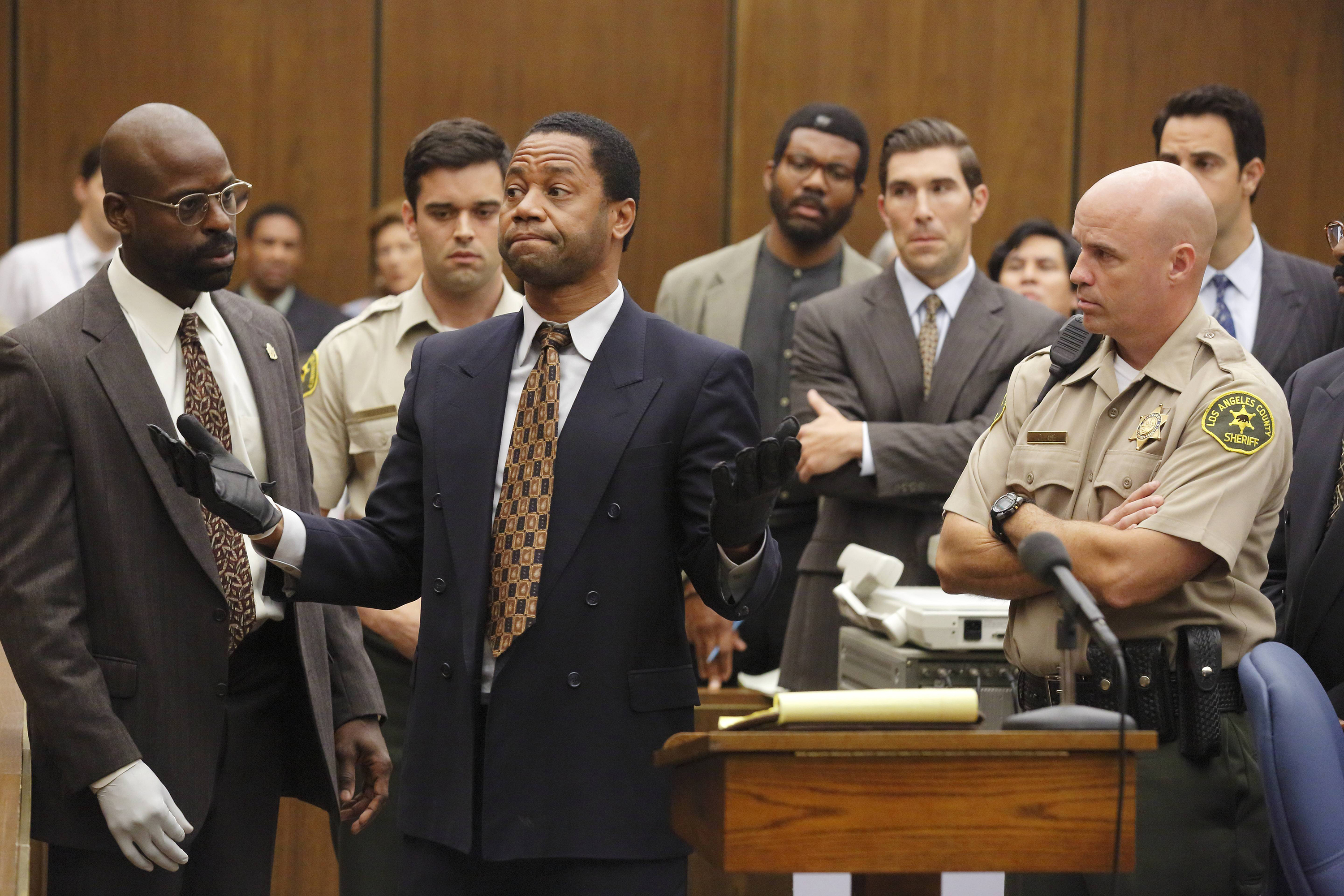A couple years back, I remember listening to the last episode of the hit podcast Serial. I remember listening to Sarah Koenig as she considered yet again the case’s facts and also its unanswered questions, flipping them around and turning them over in her hand for what seemed like the 10,000th time. Koenig, like the rest of us, was desperate for a breakthrough, something that would finally help her know for certain what happened to Hae Min Lee and whether her ex-boyfriend Adnan Syed killed her after all.
But as Serial’s final hour waned, no certainty came—and on the heels of her final “I just don’t know,” I identified with Koenig’s exasperation. And then I cried.
I cried because I felt small and narrow and irrevocably human, because my situatedness meant there were and always would be unanswered—even unanswerable—questions about what’s righteous and just and true.

Pitch-Perfect Performances
This feeling returned this week as I watched the finale of American Crime Story: The People v. O. J. Simpson. When the verdict of “not guilty” gets read, the family of the murdered Ron Goldman collapses under the weight of the words. A child of 1989, I’m too young to remember the trial. In the intervening decades, the only information that survived my memory were shards of pop-culture lore—If the glove doesn’t fit, you must acquit!—and a vaguely informed but tightly held sentiment that Simpson was guilty and the trial featured a Johnnie Cochran-led kabuki dance more than a democratic carriage of justice.
Yet every Tuesday for the past two months, I’ve watched the show, enraptured. I’m swept away by Cochran, played—no, indwelt—by Courtney B. Vance. He’s a magnetic menagerie of cadence and affectation, of self-surety and bluster, of delicacy and ruthlessness; he’s Martin Luther King Jr. meets Atticus Finch, half-revivalist and half-litigator.
I’m sympathetic toward Cuba Gooding Jr.’s Simpson, whose credulity and dependence on tacky athletic metaphors call to question his comprehension of what’s actually going on. “Put me in, coach!” he says in Episode 8, trying to persuade his counsel that he should testify on his own behalf. Simultaneously, I’m unnerved by Simpson’s volatility, that short fuse he seems constitutionally unable to lengthen.
With the exception of John Travolta as Robert Shapiro, who struts around like a stick figure with vertigo, the performances alone deserve your attention. Show creator Ryan Murphy chose a perfect mixture of the well-known (Travolta; Gooding Jr.; David Schwimmer as the skunk-coiffed Robert Kardashian) and the hopefully soon-to-be-well-known (Vance; Sterling K. Brown as the prosecution’s Christopher Darden; Sarah Paulson as the chain-smoking, fire-breathing Marcia Clark).
These actors are reason enough to watch the show, especially for those who will remember their real-life counterparts. But it’s not the only reason.
Speaks to Us Today
I’m convinced The People v. O. J. excels because it carefully and without manipulation illumines past events such that they to speak intelligently and distinctly to us today. It works because it fascinates both those who like to recollect and fact-check and those who like to mythologize and reinterpret.
Consider, for example, the temperament of Los Angeles in 1994. The Rodney King riots were barely in the rearview; the city was still recovering. Tensions were high, suspicions about police prejudice toward blacks even higher. Knowing all this, the series’ first episode begins with footage from these riots.
Two years later, the Simpson trial exacerbates this tension, Cochran most of all. He says in Episode 4: “We wouldn’t be doing our job if we didn’t talk about the role of race in this trial. And if that’s playing the ‘race card,’ then so be it.” This tactic irked Simpson: “I’m not black,” he says in Episode 3, incredulously. “I’m O. J.!”
Each episode invites the viewer to witness the trial in some sense for the first time, and to consider its commentary on today. So, with that in mind, could it be that The People v. O. J. says something to us about how we talk about race?
It would be so gleefully millennial of me to act as though this observation were novel. Of course it’s not; others older and with longer memories have said the same. As James Poniewozik of The New York Times observed, the show doesn’t traffic in history, but current events.
He’s right. The right way to watch is with one eye on the screen, the other on the past. It’s simply that my backward gaze stops sooner, filled by all the relevant events of recent years and months. While the cities and names have changed, the summary statement remains the same: “Tensions were high, suspicions about police prejudices toward blacks even higher.”
Useful for Christians
I suppose I must now straightforwardly ask: But what can Christians learn from this show? I hesitate to straightforwardly answer other than to say, I don’t know, but I’m sure you’ll learn something.
The People v. O. J. encourages us to talk about race with more nuance and understanding. So, to those who tire of the “race conversation” because they think it’s rigged, there’s something for you in the way Cochran and Darden negotiate the tenuous reality of what it means to live as a black man in America. But to those who expect changes to come quickly, there’s something for you in the way certain characters universalize the trial’s racial components by effectively erasing the individual and the importance of his or her actions. Cochran himself cynically uses race as a commodity, something to be dealt not in the service of truth, but manipulation. “Get me one black juror and I’ll give you a hung jury,” he says.
In all this, Murphy manages to make a show that’s admirably ecumenical as it relates to the racially-aligned public response following Simpson’s acquittal. Again, the show’s excellence is made manifest by its generous interpretability, overcoming upbringing and experience.
A Final Word
In Tuesday’s finale, Murphy added a scene that didn’t actually happen but nonetheless encapsulates the show’s ethos. Shortly after the trial, Cochran and Darden are conversing about the verdict. Darden lost, Cochran won. Darden is demure, Cochran is cocky. He assures his counterpart that when the time’s right he’d gladly welcome him “back into the community.”
“I never left,” Darden responds. “This isn’t a civil rights milestone; police will keep beating us and arresting us. You haven’t changed anything for black people unless you’re a famous and rich one from Brentwood.”
Cochran remains undeterred, his optimism unassailable. In the next scene, he’s standing in front of a television as President Clinton speaks about the country’s need to “spend more time listening to each other.” With tears running down his face, Cochran can barely utter the words: “Now our story is out of the shadows.”
I imagine Cochran cried because he felt big and wide and superhuman, because he felt the trial opened an opportunity to finally provide hopeful answers to so many unanswered questions, all of them in one way or another about what’s righteous and just and true. But two decades later, and with the benefit of hindsight, it appears Cochran and Darden were both right and both wrong. Some things are changing; for one, many are considering things they’d never considered, like what it means to be black or white and the possible invisible benefits or disadvantages therein.
Yet other things haven’t changed—and perhaps they won’t. There will always be unanswered and unanswerable facts of life, until every tear is wiped away. But in the interim, it’s our job as Christians to discern what’s righteous and just and true, and then to fight for it, in all its forms. Even—no, especially—when what we find, and the places in which we find it, surprise us, and perhaps even make us cry.
Involved in Women’s Ministry? Add This to Your Discipleship Tool Kit.
 We need one another. Yet we don’t always know how to develop deep relationships to help us grow in the Christian life. Younger believers benefit from the guidance and wisdom of more mature saints as their faith deepens. But too often, potential mentors lack clarity and training on how to engage in discipling those they can influence.
We need one another. Yet we don’t always know how to develop deep relationships to help us grow in the Christian life. Younger believers benefit from the guidance and wisdom of more mature saints as their faith deepens. But too often, potential mentors lack clarity and training on how to engage in discipling those they can influence.
Whether you’re longing to find a spiritual mentor or hoping to serve as a guide for someone else, we have a FREE resource to encourage and equip you. In Growing Together: Taking Mentoring Beyond Small Talk and Prayer Requests, Melissa Kruger, TGC’s vice president of discipleship programming, offers encouraging lessons to guide conversations that promote spiritual growth in both the mentee and mentor.

































